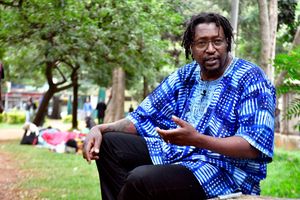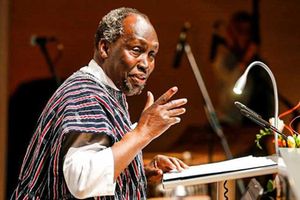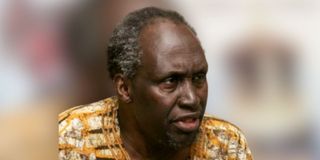
Kenyan author Ngugi wa Thiong'o speaks to Reuters during an interview during the launch of his book 'Wizard of the Crow' in Nairobi January 16, 2007.
I had the honour and privilege of knowing and working with Ngugi wa Thiong’o — not in the sterile confines of academia, but in the real world of politics and activism. He profoundly influenced my political development, shaping my thinking and worldview.
I first met Ngugi in June 1982, when he left Kenya for London. I was then working for the British Broadcasting Corporation (BBC). His arrival in London marked the beginning of an extended exile, owing to the repression that informed the Moi regime. We immediately struck good rapport with Ngugi.
London may have many meanings, being the metropolis of the British Empire and a symbol of colonialism. But in the 1980s, it served a different purpose for us. It was a vibrant hub of culture, social activism, and politics that brought together Africans and people of African descent from the Caribbean. London was then a hotbed of radicalism, a sanctuary for left-wing activists, academics, writers, students, and exiles from Africa and beyond.
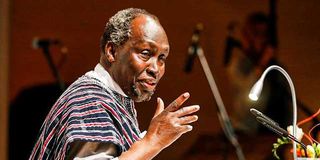
Celebrated Kenyan author and scholar the late Ngugi wa Thiong’o.
Ngugi had come fresh from the frontline of our struggle for change in Kenya. Apart from producing ground-breaking plays such Ngaahika Ndeenda and The Trial of Dedan Kimathi, establishing the Kamiriithu community centre and getting incarcerated by the state, he also played a pivotal role in the establishment of underground progressive organisations like the December Twelve Movement. He brought his vast experience to bear on our nascent diaspora political group in London, and in the neighbouring European countries.
As soon as he arrived in London, we quickly organised ourselves into a solidarity group called the Committee for the Release of Political Prisoners in Kenya (CRPPK). After drafting the objectives of the committee, it was formally launched on 2 July 1982, with John La Rose, the veteran Black community leader and founder and publisher of New Beacon Books, as chair. The committee responded to the escalating political repression and human rights abuses by the Kenyan government.
Founding members included Ngugi, Wanjiru Kihoro, Wanyiri Kihoro, Abdilatif Abdalla, Wangui wa Goro, and Nish Matenjwa — later joined by Asumbi Lango, Dan Thea and Shadrack Gutto.
The committee enjoyed support from prominent figures such as The Editor of ‘Race Today’, Darcus Howe, writer and Pan-Africanist, C.L.R. James, and a number of British MPs.
We campaigned for the release of many political prisoners, including Raila Odinga, George Anyona, Koigi wa Wamwere, Willy Mutunga, Edward Oyugi, Al-Amin Mazrui, Kamau Kuria, Maina wa Kinyatti, Kamoji Wachira, Mukaru Ng’ang’a, Ngotho Kariuki, and hundreds of other political activists languishing in Moi’s dungeons.
On 18 February 1986 — the 30th anniversary of Dedan Kimathi’s hanging — we launched a new movement at Friends House in Euston, London. This organisation was called Umoja wa Kupigania Demokrasia Kenya (UKENYA). UKENYA was the first to challenge the Moi-KANU dictatorship since the banning of the Kenya People’s Union (KPU) in 1969. The founding leadership of UKENYA included Ngugi, Wanjiru Kihoro, Abdilatif Abdalla, Wangui wa Goro, Shiraz Durrani, Nish Matenjwa and myself. I had the honour of serving as the new chair, and I delivered the keynote speech titled ‘From Mau Mau to Mwakenya’, outlining our programme and demands for change.
We adopted a clear ideological platform, grounded in evidence-based research, producing reports exposing the atrocities of the Moi regime. We documented and named victims, revealing the regime’s brutality and corruption, and challenged its propaganda and disinformation.
Our organisation mobilised UK public opinion, making it increasingly difficult for Moi and his regime to operate freely. We protested his visits — once organising a demonstration outside the Queen Elizabeth Centre near the House of Commons in Westminster, where he was scheduled to speak.
Ngugi’s political efforts
However, he was a no show. Needless to say, we were disappointed, but later, when we learnt that he had been brought in through a backdoor and was quietly taken out when the meeting was over, we were greatly excited. That the dreaded Kenyan dictator had to be smuggled in and out of such an important meeting like a thief clearly illustrated the impact our political interventions were having. After that humiliating incident, Moi’s visits to Britain became less frequent.
Ngugi served as our political teacher, conducting weekly classes on imperialism, colonialism, and neo-colonialism, drawing on resistance movements’ experiences. He led from the front, volunteering for even the smallest tasks, such as posting banners and posters during UK’s harsh winter, often suffering from respiratory issues.
His leadership and encouragement enabled me, at a young age, to serve as the founding chair of UKENYA. We connected with like-minded activists in Kenya, intensified our campaigns and exposed the regime’s atrocities internationally through protests, hence increasingly isolating Moi and his regime.
Unbeknownst to us at the time, our efforts played a significant role in shifting Kenya’s political agenda. There is no doubt that Ngugi’s political efforts were pivotal in the regime’s downfall. He contributed immensely to rolling back repression and expanding the democratic space in Kenya.
The repressive state's reaction to the launch of UKENYA was predictable. Its first move was to arrest my father, Hassan Abdi, then living in Garissa. They also ethnicised the movement, focusing on the Somali community. The Moi regime staged demonstrations, where people were mobilised to denounce UKENYA and myself, and burning our effigies.
Yet, we remained steadfast. One of Ngugi’s major political achievements was the formation of a united front of seven Kenyan left-wing organisations across the UK, USA, Canada, Denmark, Norway, Sweden and Southern Africa in October 1986. This gave birth to UMOJA, under the leadership of poet and activist Abdilatif Abdalla.
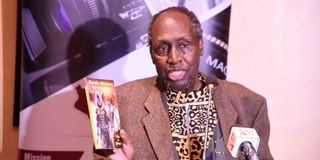
The late Ngugi wa Thiong’o during a past event.
Thus, although Ngugi is better known for his seminal fiction, I have also known him as a revolutionary and political actor who used the barrel of his pen for the liberation of Kenya and the realisation of a truly independent and prosperous nation. He always stood with the wretched of the earth. Ngugi’s radical vision empowered us to believe that another Kenya, another Africa, are both possible and worth fighting for. Remarkably, while providing leadership, he showed no interest in titles, status, or material gain, always playing his role selflessly. Throughout his life, he remained upright, unbroken, and unwavering.
Life in exile was far from easy. We faced many challenges — living in a hostile environment, under constant surveillance by British intelligence and security, given the complex relationship between the UK government and the neo-colonial Kenyan state. The cost of living was high. Harsh winters affected our health, and some children suffered allergies and ailments that pressured families to return home. When my second child was born in London, Ngugi and UKENYA members came out in solidarity and support — a practice we reciprocated for others. We stuck together as one Kenyan family, caring for one another amid adversity.
We were often comforted by Ngugi’s words: Gũtirĩ ũtukũ ũtakĩa, meaning ‘No night is so dark that it will not end in dawn.
After I left New York in 2006, following my appointment to co-lead IRIN — the UN’s humanitarian news and information network based in Nairobi — I maintained regular contact with Ngugi.
When I decided to run for the Kamukunji parliamentary seat in the 2011 by-election, Ngugi was very supportive, though deeply concerned that elements within the system might rig the election or even harm me. Despite significant obstacles, I was elected as MP for Kamukunji on 11 August 2011.
Ngugi’s concerns proved justified when I was violently attacked by assassins on 7 December 2012, sustaining serious injuries. The bomb blast, just before the 2013 elections, was evidently intended to eliminate me from the race. Ngugi closely followed my recovery, and I was delighted when, against all odds, I was re-elected by a landslide from my hospital bed on 3 March 2013.
I longed for Ngugi to visit Kamukunji, where I was now the MP. He finally visited on 9 June 2015. The event was held at Eastleigh High School and brought together students from all secondary schools in Kamukunji. It was a proud moment for the youth of the neighbourhood to meet and engage with this legendary writer and revolutionary. Other guests included my colleague, then MP for Mvita and now Governor of Mombasa, Abdullswamad Sheriff Nassir; the late Henry Chakava, Kenya’s foremost publisher; Kiarie Kamau, CEO of East African Educational Publishers; the Deputy County Commissioner of Kamukunji, and the current Governor of Trans-Nzoia, George Natembeya.
Standing there in Kamukunji, I reflected on our long political journey — the highs and lows, the pain of exile, and how we stood together to see the end of the repressive Kenyatta-Moi regimes. The atmosphere was charged with excitement, and I struggled to finish my introduction. When Ngugi took the stage, he was overcome with emotion and could not deliver his speech. It was the first time I saw Ngugi in tears — tears of joy. Only then did I truly understand how much this moment, and Ngugi’s return and solidarity, meant to him. I stepped forward to embrace him.
Hosting my political mentor and ideological comrade in Kamukunji was an extraordinarily moving experience — the high point of my tenure as MP. That moment will stay with me forever.
In conclusion, I wish to address the young men and women of Kenya: you are the future and the vanguard of the Kenyan revolution. Eschew negative ethnicity, reject being used as pawns by reactionary forces, and embrace the idea of one united, democratic Kenya. Ngugi articulated some of society’s hidden truths in his novel Petals of Blood, stating, “The truth is that our people are starved, not only of food but of knowledge, dignity, and honour. The only cure for hunger is food. The only cure for oppression is to fight back.”
Through his writings and speeches, Ngugi has laid a foundation — it is now up to our youth to rise to Kenya’s challenges and transform the nation. Franz Fanon said, “Each generation must, out of relative obscurity, discover its mission, fulfil it, or betray it.” Be the generation that fulfils its historic mission by engaging with Kenya’s historic moment and contributing to positive change. Do not wait; don’t agonise, get organised and act.
To my departed mentor, Ngugi: Your place in our hearts and in the history of resistance is secure. Your writings, thoughts and deeds will continue to inspire millions of Kenyans and Africans. You will forever be revered and celebrated as a legendary son of Africa.
The sacrifices you made for us will not be in vain. History is on our side, and the tide is turning. One day, the radical vision you fought for, will come to pass. Go Well Comrade.
Aluta Continua.
This speech was delivered at an event celebrating Ngugi wa Thiong’o’s life and works at the University of Nairobi, June 20, 2025 by Yusuf Hassan, MP, Kamukunji Constituency

